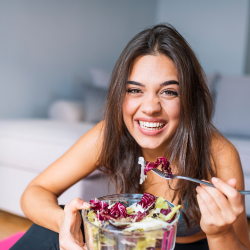Included in this post:
- TOP 6 “FOODS” TO AVOID FOR BEAUTIFUL SKIN – (and why)
- WHAT TO EAT INSTEAD
I’ve written a lot on what to eat for good skin, but what about foods NOT to eat for beautiful skin?
This is an important topic because it not only affects your skin, but it’s also crucial to avoid these foods for your overall health. So, whether you’re vegan, vegetarian, or carnivore, the following information is backed by science and will help you to achieve your best, glowing skin.
1 – SUGARY DRINKS – raise blood sugar fast
Sugary drinks, including fruit juices, are amongst the worst offenders. The liquid is absorbed so quickly that the sugar speeds into the bloodstream. This causes an excess of sugar that your body cannot use for energy so it is stored as fat. What’s more, the excess sugar locks onto your collagen peptides, causing something called Advanced Glycation End Products (AGE), which leads to the breakdown of collagen – the structure that makes skin bouncy and elastic.
What to Drink Instead: water, vegetable juice, unsweetened plant milks, tea (add fresh-squeezed lemon juice to your water for extra vitamin C and drink through a straw to protect your tooth enamel.)
2 – FLUFFY PROCESSED CARBS – empty calories, take place of vital nutrients for your skin.
This includes white bread, white rice, regular pasta (darn it), pastries, most cereals, etc. If you spend your calories on these low-fiber, empty-calorie items, you won’t have room for more nutritious choices like complex carbohydrates that can provide B vitamins for circulation, and vitamins C and E for collagen. Again, like sugary drinks, these products turn to sugar fast which locks onto collagen peptides and destroys them. What’s more, they will cause weight gain as your body cannot utilize all the energy and will store the remainder as fat.
What to Eat Instead: Quinoa, millet, buckwheat (all gluten-free), sprouted breads without flour. This is one example of a delicious mixture of grains, and takes just 20 mins to prepare (add chopped raw garlic, olive oil, soy sauce and eat over lettuce for a delicious dish). You can also find great-tasting pasta made from whole grains.
3 – ALCOHOL – dehydrating, toxic, inflammatory, oxidant
As much as I love a glass of red wine or a good IPA with dinner, I have to admit to myself that alcohol is actually a toxin. It is the opposite of an anti-oxidant: it is an oxidant. It is inflammatory, and I can see the difference in my skin if I drink too much. My face looks puffy and dehydrated. That said, I do still have an occasional glass of wine, but it’s good to know what we’re dealing with so that we can make an informed decision about our alcohol intake.
What to drink instead: Sparkling water with lemon or lime juice is my favorite go-to for a refreshing flavor contrast that gives a similar bite as a cocktail. For my Mocktail recipe, see this post.
4 – SEED OILS (except for first cold-pressed and organic)
I am talking here about the commercial oils sold in most grocery stores and used in many restaurants and in packaged foods. These are corn oil, soybean oil, sunflower oil, peanut oil, canola oil, and cottonseed oil, amongst others. When produced, they are heated at extremely high temperatures that destroy the fatty acids, creating free radicals. Chemicals such as Hexane are also used in the processing, which eliminate all the healthy components, such as vitamin e, phospholipids, squalene, polyphenols, and phytosterols. The result again: inflammation, and cellular damage. This damage can lead to smaller issues like eczema and dermatitis. What’s more, they are even implicated in cancer.
What to use instead: Extra virgin olive oil, first cold-pressed, and organic. Ideally use this unheated but you can use it for cooking as long as it doesn’t get hot enough to smoke. It’s best to add a little water to the pan to prevent it from getting too hot. EVOO is not sanitized or heated during production, as are the standard oils, because no toxic pesticides are used in the farming. Thus, the healthy fatty acids and antioxidants are preserved. Olive oil is 73% monounsaturated fat (Oleic acid) which in studies is shown to be anti-inflammatory. It is heart healthy, and supports good skin.
5 – FRIED FOODS – inflammatory, clog arteries, decrease circulation
When foods are FRIED in the seed oils mentioned above, inflammation and oxidation is worsened. These oils accumulate in cell membranes, causing damage to tissues, wherein blood clots can develop. This in turn can cause heart attacks and other diseases, clogging arteries and slowing circulation to your capillaries. Your skin pays the cost by looking sallow: a domino effect you don’t want! Frying (or browning) meat can also cause the above-mentioned AGEs, which leads to collagen degradation and sagging skin. Yikes! To reduce the chance of damage, remember to sautee or bake, whenever possible.
What to eat Instead: Instead of frying your food, add the extra virgin olive oil to the pan and add a teaspoon of water or other liquid. This will preserve the fatty acids and healthy polyphenols. The other option is to bake your food of choice. The idea is to use an oil like EVOO that is high in antioxidants and good fatty acids, and to avoid the smoking point during cooking.
6 – HYDROGENATED ANYTHING! – contain trans fats, causes molecular changes in cells, causes cancer
The process of taking an oil from a liquid to a solid is called hydrogenation; it is done with extreme heat and the addition of a hydrogen molecule. This product is solid at room temperature rather than liquid. It doesn’t need to be refrigerated and will “keep” forever (think Crisco). It benefits manufacturers but it creates trans fats which damage cells. It does so much damage to peoples’ health that in 2018, the FDA banned the use of hydrogenated oils in most processed foods. However, it is still out there. Studies have implicated trans fats in heart disease, insulin resistance, and even cancer. Hydrogenated oil is often labeled “partially hydrogenated” on food packages. Read labels and avoid this at all costs! Manufacturers can still get away with saying zero trans fats by making serving sizes very small. Look for ZERO trans fats and NO partially hydrogenated oil in the ingredient list.
What to eat instead: Read labels. If you are going to eat packaged foods (which most of us do from time to time), stick with coconut oil or even butter. These do not contain artificial trans fats. Few convenience foods will use olive oil, but that’s a good choice if you can find it.
How do YOU avoid foods that are bad for your skin? Share in the comments below!
For more on foods that WILL benefit your skin, see this post!




